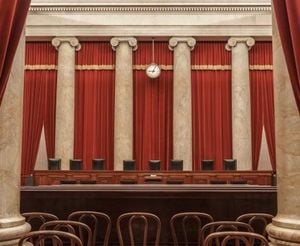On September 10, 2025, a shocking act of violence unfolded at Utah Valley University in Orem, Utah. Charlie Kirk, the 31-year-old founder of Turning Point USA and a prominent conservative activist, was fatally shot in the neck by a sniper while speaking at a campus event. The assassination sent ripples through the American political landscape, igniting heated debates about gun violence, free speech, and the boundaries of public discourse. The shooter remains unidentified and at large, according to multiple reports, including Breitbart News and The Independent.
The tragedy quickly became a flashpoint for national conversations, but it was the aftermath on social media that truly set the political world ablaze. On September 11, 2025, bestselling novelist and outspoken Republican critic Stephen King weighed in on X (formerly Twitter), initially remarking, “The motivation of the man who shot Charlie Kirk isn't clear (although he's probably mentally unstable--duh). What is clear is that it was another example of American gun violence.” This comment, as reported by SoapCentral, echoed King’s long-standing advocacy for stricter gun control, a stance that has previously drawn both praise and criticism.
But it was King’s follow-up post that triggered a firestorm. Responding to Fox News journalist Jesse Watters, who had called Kirk a “patriot” and mourned his death, King asserted, “He advocated stoning gays to death. Just sayin’.” The reaction was swift and fierce. Dave Rubin, a conservative commentator who is married to a man, condemned King’s statement as “more monstrous than any of the characters you ever came up with,” adding, “Charlie was never anything but kind to me and my husband. We broke bread many times, and he never treated us with anything other than respect. He even came to our house not too long ago and plot twist, didn’t throw rocks at us. Write about that sometime, you hack,” as cited by PJ Media.
Conservative leaders and commentators joined the chorus of outrage. Senator Mike Lee (R-Utah) took to X on September 11, calling for Kirk’s estate to sue King for defamation over what he described as a “heinously false accusation.” Lee added, “It’s a statement made with reckless disregard for the truth. You should get sued for everything you’re worth over this.” In a separate post, he reiterated, “He’s crossed a line. It will prove costly.” Senator Ted Cruz (R-TX) also condemned King’s statement, calling him a “horrible, evil, twisted liar,” as reported by Breitbart News and Raw Story. Sebastian Gorka, another prominent conservative, challenged King to produce evidence of Kirk’s alleged statements and demanded a public apology to Kirk’s widow and children.
Legal experts and social media users, however, pointed out a significant flaw in Lee’s proposed lawsuit. As noted by legal analyst Marcy Wheeler and others on Bluesky, “a dead person's estate can't sue for defamation, on account of the fact that a dead person can't suffer an injury to their reputation, because they are dead.” The debate over whether King’s claim was defamatory quickly became entangled with questions about the limits of posthumous legal action and the broader implications for free speech.
At the heart of the controversy lies the question: Did Charlie Kirk ever advocate stoning homosexuals to death? According to Raw Story and The Independent, Kirk was a vocal critic of what he termed the “LGBTQ agenda.” He frequently cited Leviticus 20:13—“God’s perfect law when it comes to sexual matters”—which calls for the execution of homosexuals. However, there is no public record of Kirk explicitly calling for the stoning of gays. In fact, as Dave Rubin and others have argued, Kirk’s personal interactions, including with members of the LGBTQ community, did not reflect such views. Kirk’s rhetoric, while undeniably provocative and often inflammatory, stopped short of advocating violence, according to those who knew him personally.
Kirk’s positions on LGBTQ rights and gun control were well-documented. He opposed same-sex marriage, gender-affirming care, and non-binary identities, and in September 2024, he told a gay college student in Wisconsin, “I don’t agree with your lifestyle. I don’t think you should introduce yourself just based on your sexuality because that’s not who you are.” At a rally in Arizona, he wore a t-shirt reading “xy = man” and denounced gender-affirming care. In June 2025, Kirk tweeted that it should be legal to burn PRIDE or Black Lives Matter flags in public, arguing that “we should work to overturn every conviction for those arrested, fined, or otherwise harassed for the ‘hate crime’ of doing donuts over Pride flags painted on public streets.” He also praised Uganda’s anti-gay policies, including the death penalty, as a “step in the right direction,” though he acknowledged they were “extreme.”
On the issue of guns, Kirk was an ardent defender of the Second Amendment. He owned firearms and, in the wake of the 2018 Parkland shooting, spoke on behalf of the National Rifle Association. At a 2023 Turning Point USA event in Salt Lake City, he remarked, “It’s worth it to have a cost of, unfortunately, some gun deaths every single year so that we can have the Second Amendment.” He argued that gun rights were essential for self-defense against tyranny, a message he reiterated up until his death.
The political fallout from Kirk’s assassination and King’s comments has been intense. President Donald Trump ordered all U.S. flags to be flown at half-mast until 6:00 p.m. on Sunday, September 14, in Kirk’s honor, calling him a “Great American Patriot” and vowing to seek justice. Senator Mike Lee, speaking at Utah Valley University, described Kirk’s killing as a “cowardly act of violence” and praised his “boundless energy and great love for his country,” according to SoapCentral. “The terrorists will not win, Charlie will,” Lee declared.
This episode has also revived scrutiny of both Stephen King and Mike Lee’s previous public statements. King, after the 2024 assassination attempt on Donald Trump, posted, “An AR-15 style semiautomatic rifle was used in the Butler shooting. These are the guns the Republican Party—and Trump—want to protect.” Lee, for his part, faced backlash for his response to the 2025 shootings of Minnesota Democratic politicians, writing, “This is what happens when Marxists don’t get their way,” a comment widely criticized as insensitive and divisive.
As the investigation into Kirk’s assassination continues and the nation grapples with the implications, the clash between King and Kirk’s defenders underscores the deepening rift in American society. The debate over rhetoric, responsibility, and the limits of free speech is far from settled. Kirk is survived by his wife Erika and their two children, as the country mourns a figure both celebrated and reviled, and as voices on all sides wrestle with the consequences of words and actions in an era of heightened political tension.




